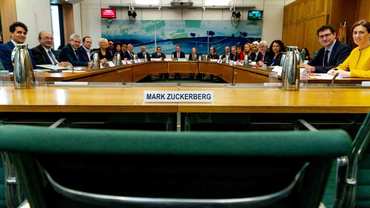Pivot
 Would you buy a used social media platform from this man?
Would you buy a used social media platform from this man?
"As I think about the future of the internet, I believe a privacy-focused communications platform will become even more important than today's open platform," Mark Zuckerberg wrote this week at the Facebook blog, also summarized at the Guardian.
Zuckerberg goes on to compare Facebook and Instagram to "the digital equivalent of a town square".
So many errors, so little time. Neither Facebook nor Instagram is open. "Open information, Rufus Pollock explained last year in The Open Revolution, "...can be universally and freely used, built upon, and shared." While, "In a Closed world information is exclusively 'owned' and controlled, its attendant wealth and power more and more concentrated".
The alphabet is open. I do not need a license from the Oxford English Dictionary to form words. The web is open (because Tim Berners-Lee made it so). One of the first social media, Usenet, is open. Particularly in the early 1990s, Usenet really was the Internet's town square.
*Facebook* is *closed*.
Sure, anyone can post - but only in the ways that Facebook permits. Running apps requires Facebook's authorization, and if Facebook makes changes, SOL. Had Zuckerberg said - as some have paraphrased him - "town hall", he'd still be wrong, but less so: even smaller town halls have metal detectors and guards to control what happens inside. However, they're publicly owned. Under the structure Zuckerberg devised when it went public, even the shareholders have little control over Facebook's business decisions.
So, now: this week Zuckerberg announced a seeming change of direction for the service. Slate, the Guardian, and the Washington Post all find skepticism among privacy advocates that Facebook can change in any fundamental way, and they wonder about the impact on Facebook's business model of the shift to focusing on secure private messaging instead of the more public newsfeed. Facebook's former chief security officer Alex Stamos calls the announcement a "judo move" that removes both the privacy complaints (Facebook now can't read what you say to your friends) and allows the site to say that complaints about circulating fake news and terrorist content are outside its control (Facebook now can't read what you say to your friends *and* doesn't keep the data).
But here's the thing. Facebook is still proposing to unify the WhatsApp, Instagram, and Facebook user databases. Zuckerberg's stated intention is to build a single unified secure messaging system. In fact, as Alex Hern writes at the Guardian that's the one concrete action Zuckerberg has committed to, and that was announced back in January, to immediate privacy queries from the EU.
The point that can' t be stressed enough is that although Facebook is trading away the ability to look at the content of what people post it will retain oversight of all the traffic data. We have known for decades that metadata is even more revealing than content; I remember the late Caspar Bowden explaining the issues in detail in 1999. Even if Facebook's promise to vape the messages doesn't include keeping no copies for itself (a stretch, given that we found out in 2013 that the company keeps every character you type), it will be able to keep its insights into the connections between people and the conclusions it draws from them. Or, as Hern also writes, Zuckerberg "is offering privacy on Facebook, but not necessarily privacy from Facebook".
Siva Vaidhyanathan, author of Antisocial Media, seems to be the first to get this, and to point out that Facebook's supposed "pivot" is really just a decision to become more dominant, like China's WeChat.WeChat thoroughly dominates Chinese life: it provides messaging, payments, and a de facto identity system. This is where Vaidhyanathan believes Facebook wants to go, and if encrypting messages means it can't compete in China...well, WeChat already owns that market anyway. Let Google get the bad press.
Facebook is making a tradeoff. The merged database will give it the ability to inspect redundancy - are these two people connected on all three services or just one? - and therefore far greater certainty about which contacts really matter and to whom. The social graph that emerges from this exercise will be smaller because duplicates will have been merged, but far more accurate. The "pivot" does, however, look like it might enable Facebook to wriggle out from under some of its numerous problems - uh, "challenges". The calls for regulation and content moderation focus on the newsfeed. "We have no way to see the content people write privately to each other" ends both discussions, quite possibly along with any liability Facebook might have if the EU's copyright reform package passes with Article 11 (the "link tax") intact.
Even calls that the company should be broken up - appropriate enough, since the EU only approved Facebook's acquisition of WhatsApp when the company swore that merging the two databases was technically impossible - may founder against a unified database. Plus, as we know from this week's revelations, the politicians calling for regulation depend on it for re-election, and in private they accommodate it, as Carole Cadwalladr and Duncan Campbell write at the Guardian and Bill Goodwin writes at Computer Weekly.
Overall, then, no real change.
Illustrations: The international Parliamentary committee, with Mark Zuckerberg's empty seat.
Wendy M. Grossman is the 2013 winner of the Enigma Award. Her Web site has an extensive archive of her books, articles, and music, and an archive of earlier columns in this series. Stories about the border wars between cyberspace and real life are posted occasionally during the week at the net.wars Pinboard - or follow on Twitter.